DEI efforts
Challenges continue regarding
expanding diversity in the
boardroom and C-suites

DEI efforts
Challenges continue
regarding expanding
diversity in
the boardroom
and C-suites

As we have seen over the past number of years, and will continue to see throughout 2023, corporations are focused on expanding diversity. This is a laudable goal, but it does not come without legal risks. Legislatures and private citizens alike have taken action against certain diversity, equity and inclusion (DEI) initiatives. Programs seeking to boost representation of select demographic groups in executive ranks, boardrooms and the workforce more broadly have received backlash, particularly when the companies’ goals have numeric targets attached to them1.
DEI programming can come in many different forms. Some companies have focused on building the diversity pipeline by offering certain programming, such as fellowships or mentorships, to minority groups, often accompanied by scholarships or monetary grants2. Other companies have set multi-year, aspirational goals to increase their workforce diversity generally, or in specific roles3. Still other companies have focused on the power of the purse, looking for opportunities to increase spending with minority and women-owned businesses4.
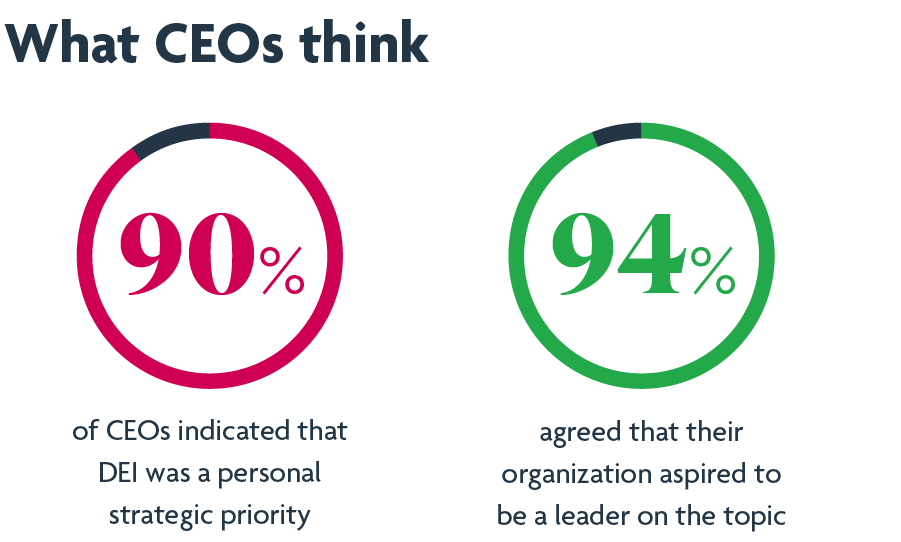
Challengers to these programs allege that these initiatives discriminate against individuals outside of the protected group(s) at which they are aimed, in violation of applicable anti-discrimination law5. For example, last year an anti-DEI activist group backed a proposed class action against Amazon, alleging that its “Black Business Accelerator” program, which provides $10,000 grants to diverse delivery service entrepreneurs, unlawfully discriminated against non-black owned businesses in violation of Section 19816. Disgruntled employees also have taken aim at their employers. A white male healthcare executive, for example, received a multi-million-dollar award after claiming his former employer fired him as part of its diversity efforts7.
DEI initiatives are also being attacked by activist shareholders. In 2022 alone, the National Center for Public Policy Research (NCPPR), a foundation dedicated to advancing the “conservative movement,” submitted proposals that resulted in 12 companies across various industries, putting the group’s anti-DEI proposals to vote8. Most of these proposals requested that the board commission an audit analyzing the impact of DEI policies on the company’s business, including, in some proposals, the impact on “non-diverse” employees9.

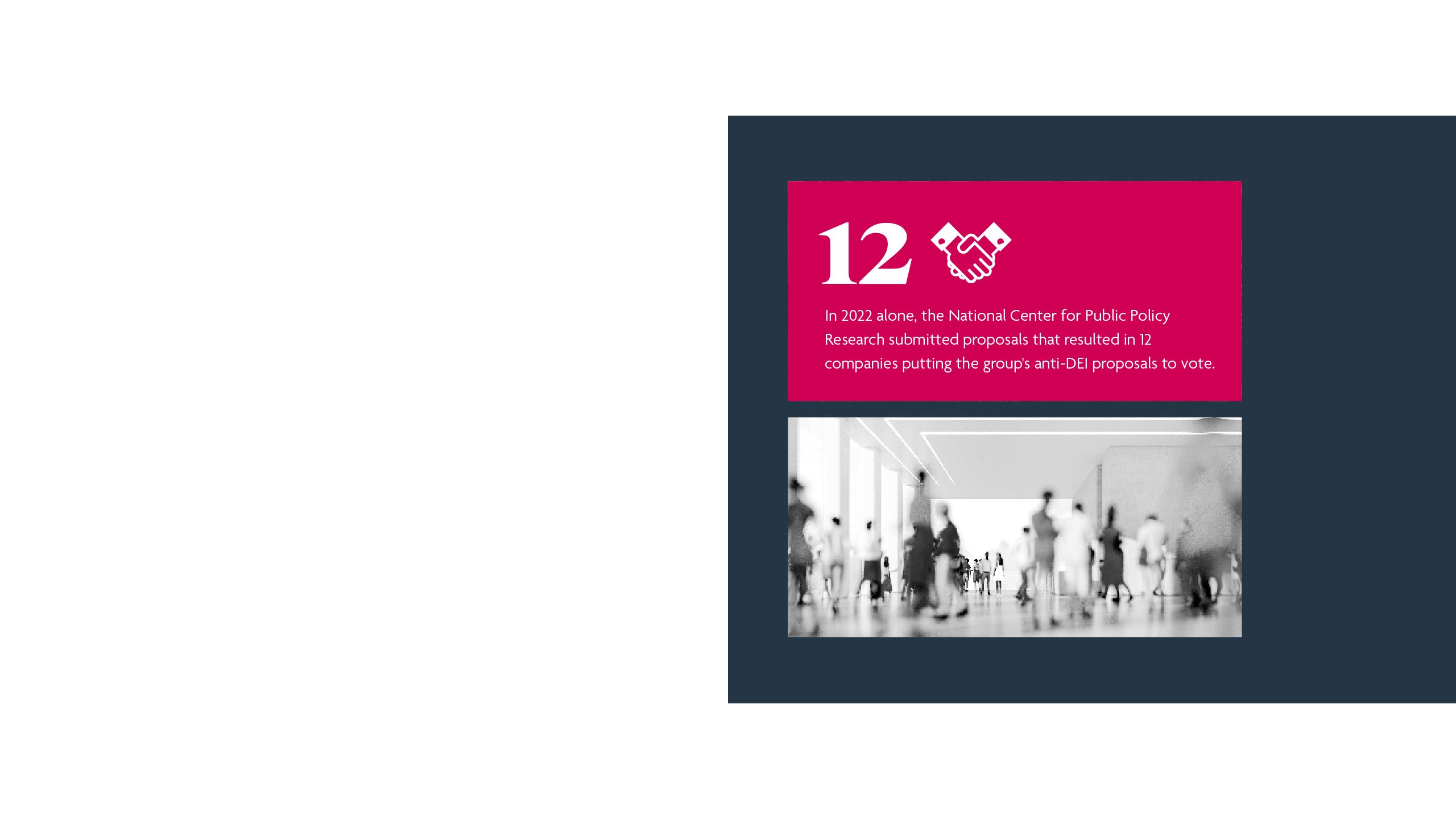
As we have seen over the past number of years, and will continue to see throughout 2023, corporations are focused on expanding diversity. This is a laudable goal, but it does not come without legal risks. Legislatures and private citizens alike have taken action against certain diversity, equity and inclusion (DEI) initiatives. Programs seeking to boost representation of select demographic groups in executive ranks, boardrooms and the workforce more broadly have received backlash, particularly when the companies’ goals have numeric targets attached to them1.
DEI programming can come in many different forms. Some companies have focused on building the diversity pipeline by offering certain programming, such as fellowships or mentorships, to minority groups, often accompanied by scholarships or monetary grants2. Other companies have set multi-year, aspirational goals to increase their workforce diversity generally, or in specific roles3. Still other companies have focused on the power of the purse, looking for opportunities to increase spending with minority and women-owned businesses4.

Challengers to these programs allege that these initiatives discriminate against individuals outside of the protected group(s) at which they are aimed, in violation of applicable anti-discrimination law5. For example, last year an anti-DEI activist group backed a proposed class action against Amazon, alleging that its “Black Business Accelerator” program, which provides $10,000 grants to diverse delivery service entrepreneurs, unlawfully discriminated against non-black owned businesses in violation of Section 19816. Disgruntled employees also have taken aim at their employers. A white male healthcare executive, for example, received a multi-million-dollar award after claiming his former employer fired him as part of its diversity efforts7.
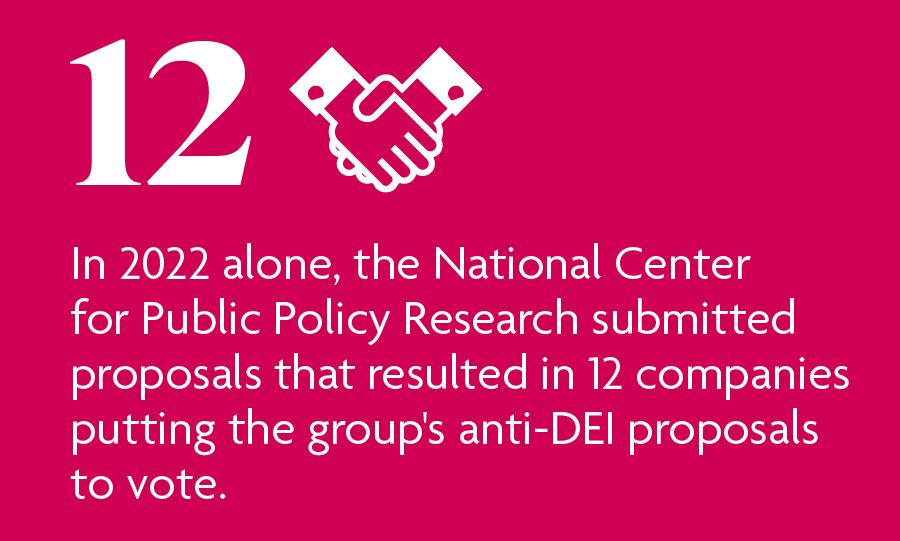
DEI initiatives are also being attacked by activist shareholders. In 2022 alone, the National Center for Public Policy Research (NCPPR), a foundation dedicated to advancing the “conservative movement,” submitted proposals that resulted in 12 companies across various industries, putting the group’s anti-DEI proposals to vote8. Most of these proposals requested that the board commission an audit analyzing the impact of DEI policies on the company’s business, including, in some proposals, the impact on “non-diverse” employees9.
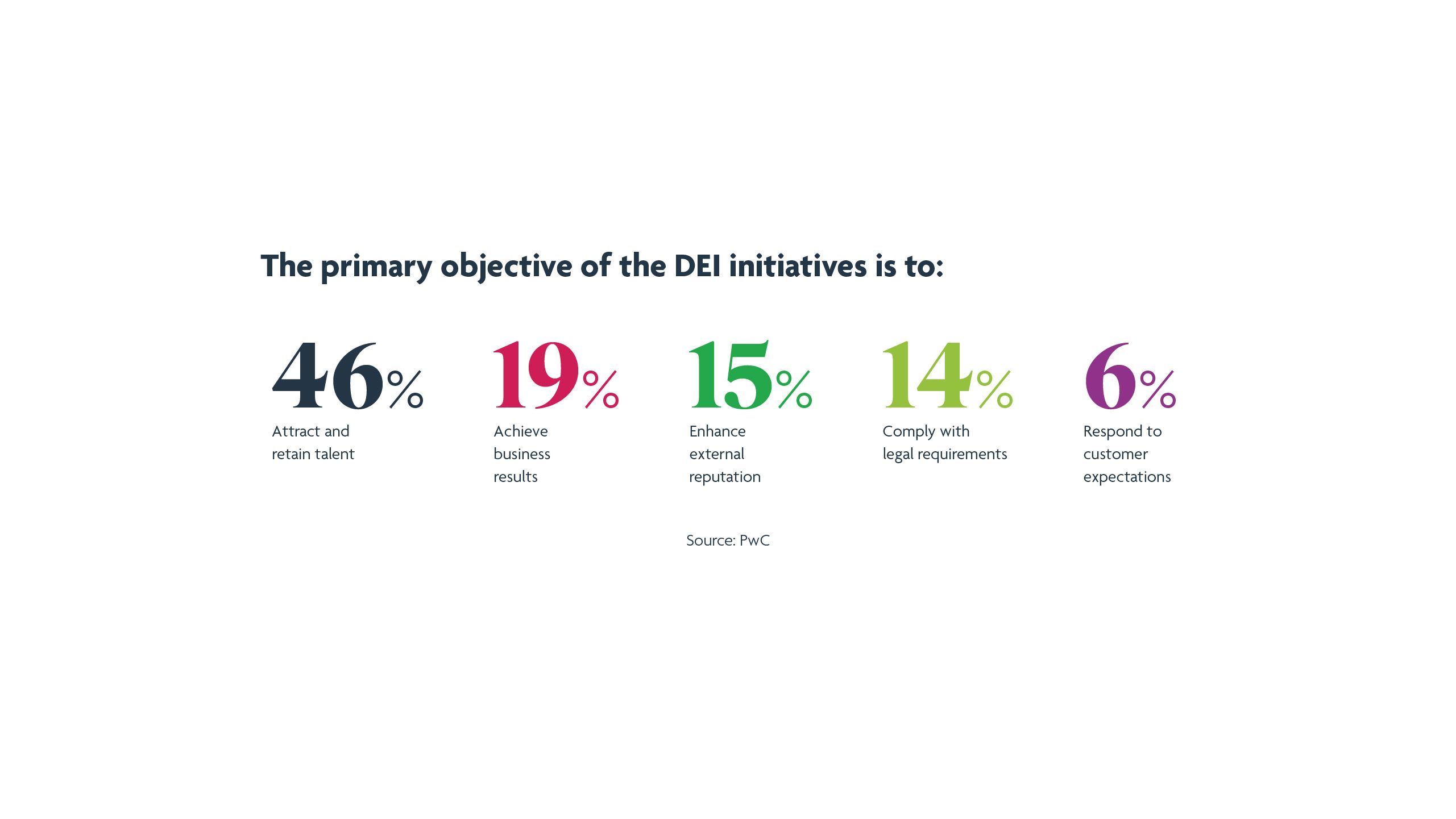
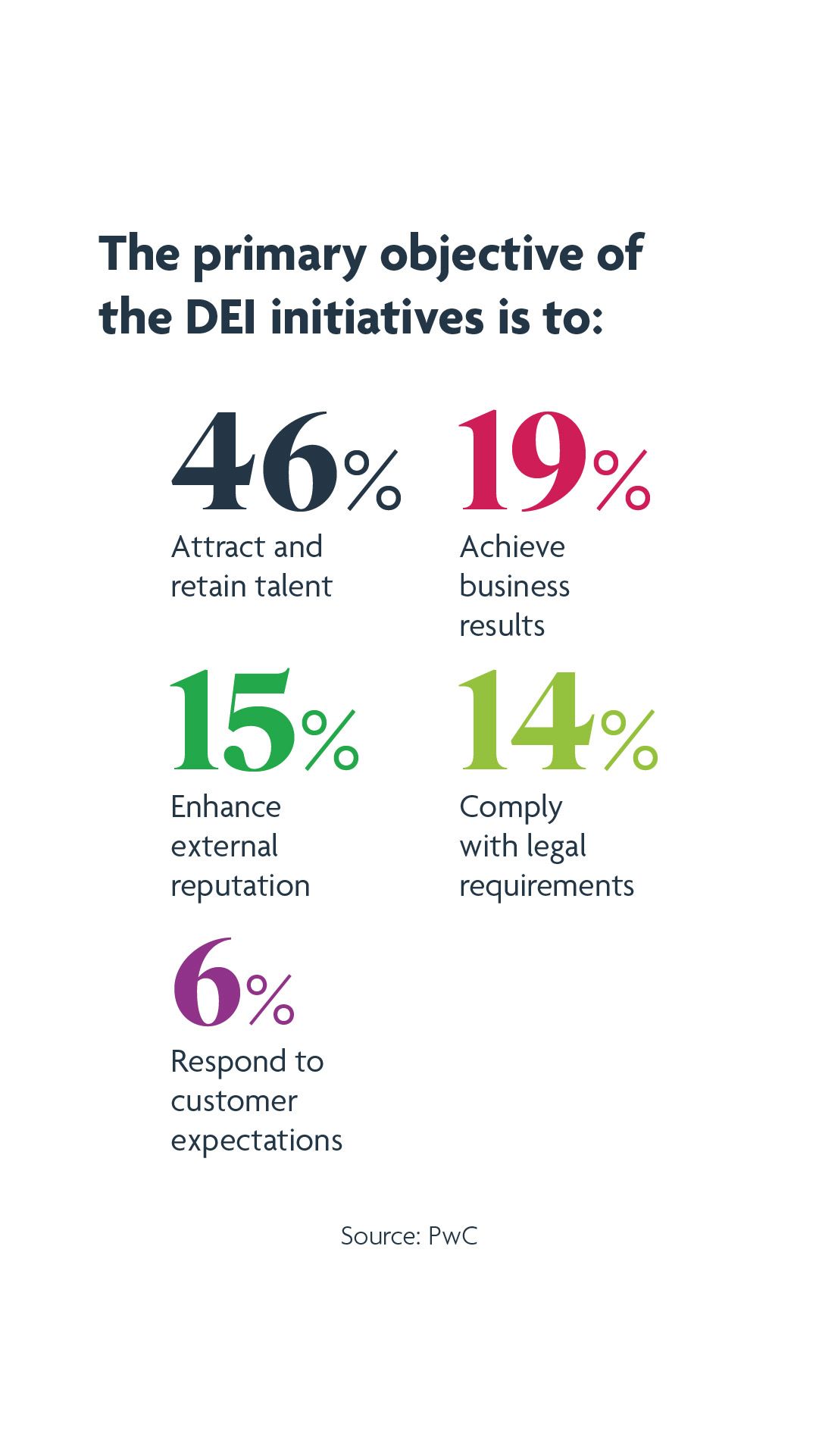
Another avenue of attack is DEI policy retraction demands. Since 2021, the American Civil Rights Project (ACRP), a law firm that represents clients such as NCPPR, has sent at least seven retraction demand letters, threatening to sue companies if such companies refused to retract certain DEI policies10. These groups have also employed a strategy of sending requests to the Equal Employment Opportunity Commission to open civil rights investigations into companies’ human resources and promotion practices11. Such requests can be problematic for employers, given the agency’s ability to use a Commissioner’s charge or a directed investigation to probe individual or, more commonly, systemic discrimination concerns without the need for an aggrieved party to first file a claim12.

The Individual Freedom Act, also known as the Stop the Wrongs to Our Kids and Employees Act (the “Stop W.O.K.E.” Act)13. This Act amends the Florida Civil Rights Act of 1992 by adding a new section to define certain DEI programs as unlawful discrimination if mandated by employers, associations or certification organizations14. The Stop W.O.K.E. Act is drafted broadly, purportedly covering DEI programs that (i) involve training, instruction, or certain other enumerated activities; (ii) espouse, promote, advance, inculcate or compel an individual to believe any of eight identified discriminatory concepts15; and (iii) are a condition of employment, membership, certification, licensing, credentialing or passing an examination16. The Stop W.O.K.E. Act is the subject of numerous legal challenges17.
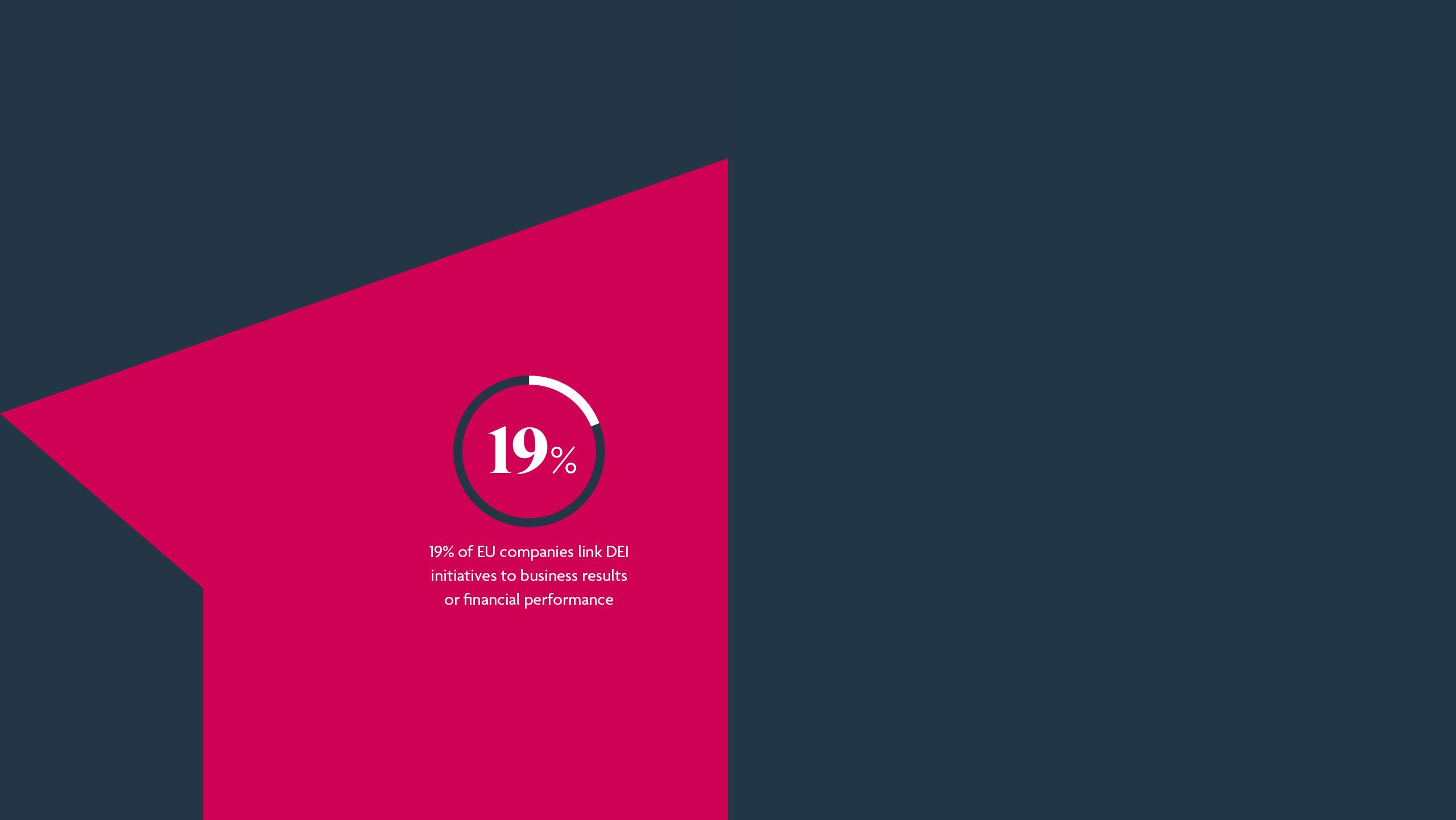
Another avenue of attack is DEI policy retraction demands. Since 2021, the American Civil Rights Project (ACRP), a law firm that represents clients such as NCPPR, has sent at least seven retraction demand letters, threatening to sue companies if such companies refused to retract certain DEI policies10. These groups have also employed a strategy of sending requests to the Equal Employment Opportunity Commission to open civil rights investigations into companies’ human resources and promotion practices11. Such requests can be problematic for employers, given the agency’s ability to use a Commissioner’s charge or a directed investigation to probe individual or, more commonly, systemic discrimination concerns without the need for an aggrieved party to first file a claim12.

The Individual Freedom Act, also known as the Stop the Wrongs to Our Kids and Employees Act (the “Stop W.O.K.E.” Act)13. This Act amends the Florida Civil Rights Act of 1992 by adding a new section to define certain DEI programs as unlawful discrimination if mandated by employers, associations or certification organizations14. The Stop W.O.K.E. Act is drafted broadly, purportedly covering DEI programs that (i) involve training, instruction, or certain other enumerated activities; (ii) espouse, promote, advance, inculcate or compel an individual to believe any of eight identified discriminatory concepts15; and (iii) are a condition of employment, membership, certification, licensing, credentialing or passing an examination16. The Stop W.O.K.E. Act is the subject of numerous legal challenges17.
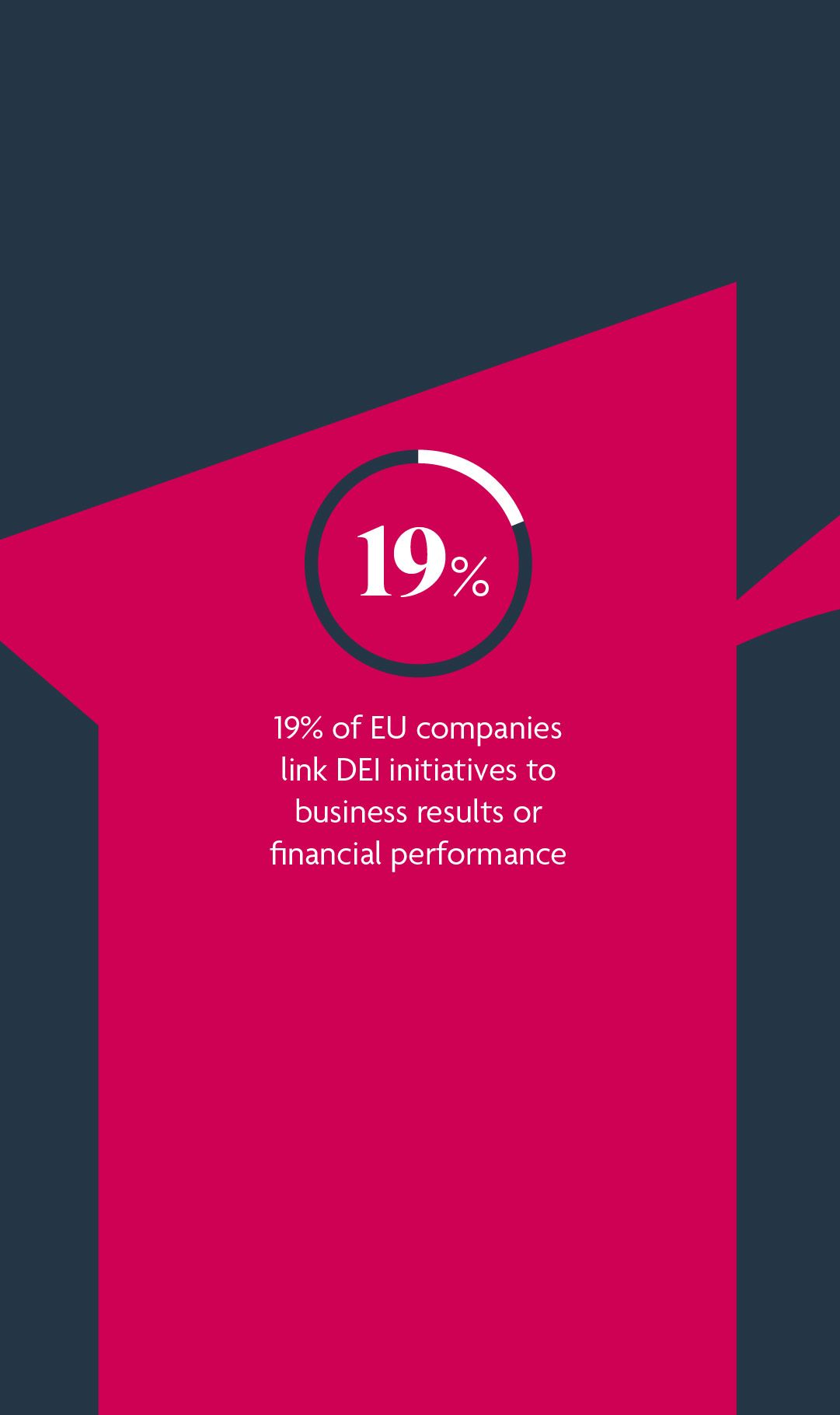

The European Union (EU) and United Kingdom (U.K.) have not seen the same degree of activism challenging affirmative action as has occurred in the U.S. This may be partly a reflection of the law being more settled in this area than in the U.S. and partly that there seems to be less controversy amongst politicians over the issue. However, while DEI efforts have publicly been embraced by many organizations, implementation and progress in Europe has been mixed. A recent survey by PricewaterhouseCoopers (PwC) suggested that some EU organizations have struggled to translate commitments into tangible action plans. According to the survey, 60% of the companies surveyed use DEI initiatives to attract talent or to comply with applicable legal requirements; however, only 19% link such DEI initiatives to actual business results or financial performance18. In the U.K., DEI efforts have likewise been embraced, including by the U.K. government, which recently announced a program to promote diversity within the civil service. Nevertheless, at least one report suggests that almost one-third of British companies have not adopted or developed strategic programs to support DEI efforts19. It is notable that the substance and focus of DEI varies across geographies.

The DEI space is an evolving one, with many companies remaining committed to entrenching diversity, equity and inclusion in their corporate ethos. These efforts are not risk free, and we fully expect such efforts to remain subject to legal, public relations and other challenges as certain stakeholders continue to push back.

The European Union (EU) and United Kingdom (U.K.) have not seen the same degree of activism challenging affirmative action as has occurred in the U.S. This may be partly a reflection of the law being more settled in this area than in the U.S. and partly that there seems to be less controversy amongst politicians over the issue. However, while DEI efforts have publicly been embraced by many organizations, implementation and progress in Europe has been mixed. A recent survey by PricewaterhouseCoopers (PwC) suggested that some EU organizations have struggled to translate commitments into tangible action plans. According to the survey, 60% of the companies surveyed use DEI initiatives to attract talent or to comply with applicable legal requirements; however, only 19% link such DEI initiatives to actual business results or financial performance18. In the U.K., DEI efforts have likewise been embraced, including by the U.K. government, which recently announced a program to promote diversity within the civil service. Nevertheless, at least one report suggests that almost one-third of British companies have not adopted or developed strategic programs to support DEI efforts19. It is notable that the substance and focus of DEI varies across geographies.

The DEI space is an evolving one, with many companies remaining committed to entrenching diversity, equity and inclusion in their corporate ethos. These efforts are not risk free, and we fully expect such efforts to remain subject to legal, public relations and other challenges as certain stakeholders continue to push back.
Authors
Esther G. Lander
Partner
Richard J. Rabin
Partner

Anastasia Kerdock
Senior Practice Attorney

Emily Shapiro
Law Clerk
eshapiro@akingump.com
New York
T+1 212.872.1041


